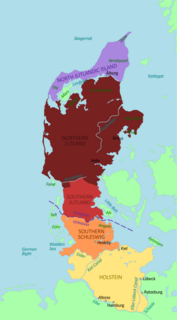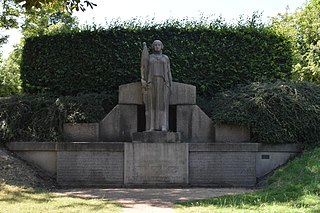 W
WThe First Schleswig War or Three Years' War was the first round of military conflict in southern Denmark and northern Germany rooted in the Schleswig-Holstein Question, contesting the issue of who should control the Duchies of Schleswig and Holstein. The war, which lasted from 1848 to 1851, also involved troops from Prussia and Sweden. Ultimately, under international pressure, the Prussians had to withdraw their forces. As a result, the war ended in a Danish victory over the rebels and the signing of the London Protocol in 1852. A second conflict, the Second Schleswig War, erupted in 1864.
 W
WThe Second Schleswig War was the second military conflict over the Schleswig-Holstein Question of the nineteenth century. The war began on 1 February 1864, when Prussian and Austrian forces crossed the border into Schleswig. Denmark fought the Kingdom of Prussia and the Austrian Empire. Like the First Schleswig War (1848–1852), it was fought for control of the duchies of Schleswig, Holstein and Lauenburg, due to the succession disputes concerning them when the Danish king died without an heir acceptable to the German Confederation. The war started after the passing of the November Constitution of 1863, which integrated the Duchy of Schleswig into the Danish kingdom in violation of the London Protocol.
 W
WWilhelm Bauer was a Bavarian inventor and engineer who built several hand-powered submarines.
 W
WThe Danish Royal Enclaves were the territory of the Kingdom of Denmark which was located within the Duchy of Schleswig. After the Second Schleswig War, most of these areas were, like the rest of Schleswig, ceded to the Kingdom of Prussia. Most of these areas were returned after the 1920 Schleswig plebiscites.
 W
WThe Gastein Convention, also called the Convention of Badgastein, was a treaty signed at Bad Gastein in Austria on 14 August 1865. It embodied agreements between the two principal powers of the German Confederation, Prussia and Austria, over the governing of the 'Elbe Duchies' of Schleswig, Holstein and Saxe-Lauenburg.
 W
WThe London conference of 1864 was a peace conference on the Second Schleswig War that took place in London from 25 April to 25 June 1864.
 W
WThe Isted Lion, German: Flensburger Löwe or Idstedter Löwe) is a Danish war monument originally intended as a monument of the Danish victory over German-minded Schleswig-Holstein insurgents in the Battle of Isted (Idstedt) on 25 July 1850, during the First Schleswig War which was a civil war within the Danish Realm, although with troops from Prussia supporting the Schleswig-Holstein insurgents. At its time it was the largest battle in Scandinavian history.
 W
WOn 8 May 1852, after the First War of Schleswig, an agreement called the London Protocol was signed. This international treaty was the revision of an earlier protocol, which had been ratified on 2 August 1850, by the major Germanic powers of Austria and Prussia. The second London Protocol was recognised by the five major European powers—Austria, France, Prussia, Russia, and the United Kingdom—as well as by the Baltic Sea powers of Denmark and Sweden.
 W
WThe Memorial to Nordic Volunteers and Fallen, located on Smedelinien, part of Kastellet, is a memorial to 28 Norwegian, Swedish and Finnish volunteers of the First (1848-50) and First Schleswig War (1864). It was inaugurated in 1920 to design by Anders Bundgaard.
 W
WThe Schleswig-Holstein Question was a complex set of diplomatic and other issues arising in the 19th century from the relations of two duchies, Schleswig and Holstein, to the Danish crown, to the German Confederation, and to each other. The British statesman Lord Palmerston is reported to have said: "Only three people have ever really understood the Schleswig-Holstein business—the Prince Consort, who is dead—a German professor, who has gone mad—and I, who have forgotten all about it."